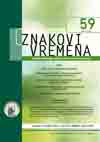Hermeneutička gesta – tumačenje kao haphelogija
A Hermeneutic Gesture – Understanding as Haphelogia
Author(s): Anita MilićevićSubject(s): Philosophy
Published by: Naučnoistraživački institut »Ibn Sina«
Keywords: hermeneutics; hapheologia; subject; body; corporeal; otherness; reading
Summary/Abstract: A hermeneutic gesture is an attempt of determining a hermeneutic gesture on two levels. The first is the level of touch, i.e. direct contact with the object of interpretation. The second is a distance from the subject of interpretation, i.e. a reflexion about it. This means that the understanding of hermeneutics at the latter level deals with ontology, and thus with the understanding of interpretation itself – what it means to interpret and what is the relationship of the subject and the cat of understating. We will not see understanding as a purely theoretical issue, but rather relate it to the concept of aesthesis, which will synthetize the theoretical, the practical and the poetic. A hermeneutic gesture contains the ontological element as an experiential one, meaning that it contains observation, action and production. The neologism haphelogia denotes primarily the link between subjects in a hermeneutic field, which is also the space for ethics and literature, i.e. a manifestation of the corporal in the world and the relationship between a subject and the world. Understating as haphelogia indicates that it is a dual operation – a touch and a distance, i.e. an attempt to establish a relationship and a reflexion about that relationship. This can be understood as the rhythm of poetic imagination and an action of a hermeneutic gesture. The touch (haphe) is a metaphor of connections and links created through interpretation. Interpreting is touch as well as distance and transfer (meta-pherein). A body is thus a metaphor for text, its production and action in different situations and readings. Every new interpretation and reading opens a new space for invention and events. Thus, text resists theology that leads to a particular purpose that the history of literature rests on. Interpretation is always a new pro-delivery of text, and literature is the space between determination and freedom. Literature is thus linked to ethics specifically because of this space of freedom and imagination, which includes - to use Ricoeur’s words - the element of otherness in the initial gesture of establishing the self. Otherness is not outside – it is a constituent of the subject.
Journal: Znakovi vremena - Časopis za filozofiju, religiju, znanost i društvenu praksu
- Issue Year: 2013
- Issue No: 59
- Page Range: 93-108
- Page Count: 16
- Language: Bosnian

